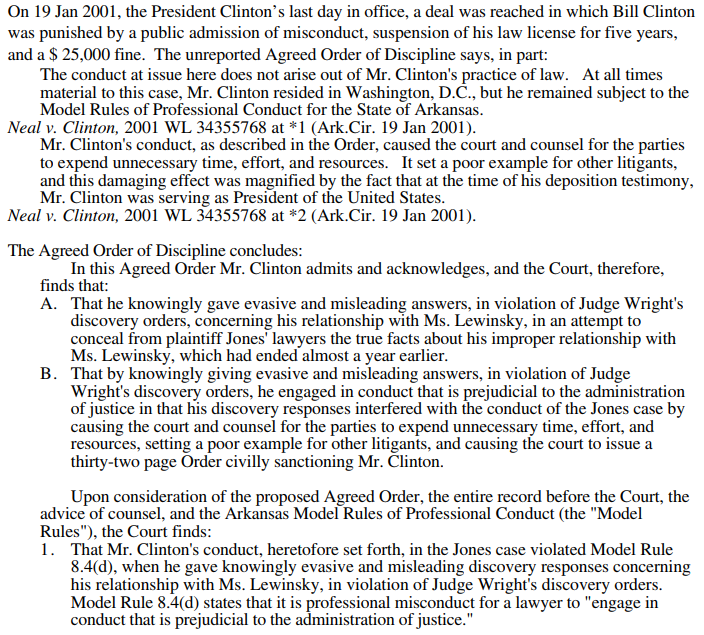Was Bill Clinton ever formally charged with a crime?
Yes, a grand jury is a formal process that produces a "charge sheet" also known as an "indictment", so yes. It is the only way Robert Ray could have proceeded with the remainder of the case.
No, The Justice Department never completed its formalities.
I think, technically, no; but he did plead guilty. [See below.]
President Clinton admits he lied under oath about his affair with Monica Lewinsky in 2001, JAN 19, 2016 (Originally published by the Daily News on January 20, 2001.):
President Clinton escaped indictment yesterday by surrendering his Arkansas law license for five years and admitting that he made false statements under oath about his affair with Monica Lewinsky.
News of the deal with independent counsel Robert Ray ...
Robert Ray was the independent counsel investigating the Whitewater Scandal.
Ray's chances of securing an indictment - let alone a conviction - from a Washington jury were widely considered slim to none.
The deal, which wraps up the two last loose ends - Clinton's possible perjury indictment and the Arkansas Bar's pending disbarment proceeding - was hammered out by Ray and Kendall amid a growing political consensus that nothing would be gained from seeing a former President dragged into court.
Judicial Watch, the conservative legal group that has filed dozens of fruitless lawsuits against the Clinton White House, responded with the gut rage that many Clinton haters felt as they watched their last hope of seeing him jailed evaporate.
The group slammed Ray, saying the deal was "an abuse of his office."
From a comment:
Would you have any clue what Napolitano was referring to then?
Using the exact search "Clinton" "2001" "Robert Ray" "indictment" -whitewater provided several (more that 3000) "hits" concerning "plea deal" and "Avoid(s) Indictment"; but none, that I read, show that an an indictment was filed with a court. [The same search with "2000" did not reveal anything I found significant.] Had an indictment been filed, it would have been in the news. I speculate, since that all I have to go on at the moment, that a Grand Jury returned an indictment (against Bill Clinton, signed by the foreperson and given to Robert Ray) and that Robert Ray delayed filing the indictment with the court. Ray then used that indictment to "convince" Bill Clinton to accept a deal.
The title of the cited news article is Robert Mueller's conclusion disputed by Judge Napolitano: Yes, a sitting president can be indicted. Napolitano appears to be referring to an indictment, in November 2000 that caused Bill Clinton to plead guilty to charges misconduct in January, 2001. That is, if Bill Clinton was indicted, than any "sitting President" can be indicted. This is a disagreement with the idea that a "sitting President" cannot be indicted per the OLC memo.
Did Bill Clinton plead guilty?
The word "guilty" was not used; but "admits and acknowledges" is an equivalent. One that was necessary for Robert Ray to close the Federal investigation. So, yes.
Bill Clinton was not facing charges, but, rather disciplinary action.
Page 7-1:
 2 Hogue v. Neal, 12 S.W.3d 186 (Ark. 27 Jan 2000).
2 Hogue v. Neal, 12 S.W.3d 186 (Ark. 27 Jan 2000).
Following are snips of a PDF providing an introduction and some contents of the Agreed Order of Discipline.
Page 7:
 Page 8:
Page 8:

From the Chicago Tribune IT TAKES A PLEA AGREEMENT, January 23, 2001:
The agreement also includes an unequivocal admission of wrongdoing, with Clinton acknowledging that he gave false answers in his Jones deposition. As part of the deal, he was compelled to sign an "Agreed Order of Discipline" which states that he "knowingly" engaged in "conduct that is prejudicial to the administration of justice." That is the disciplinary equivalent of pleading guilty to obstruction of justice.


